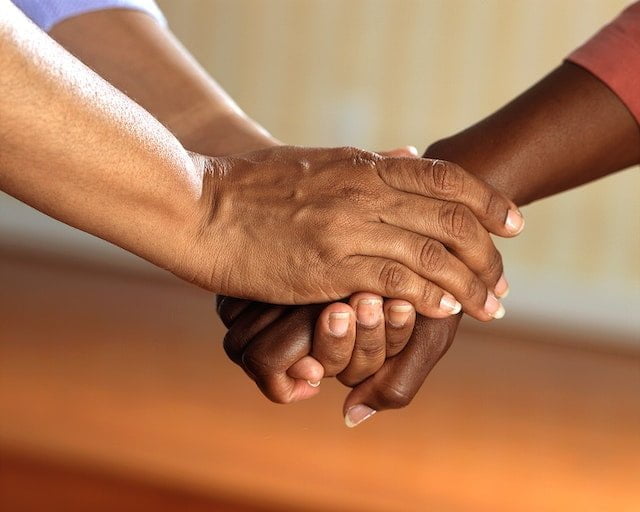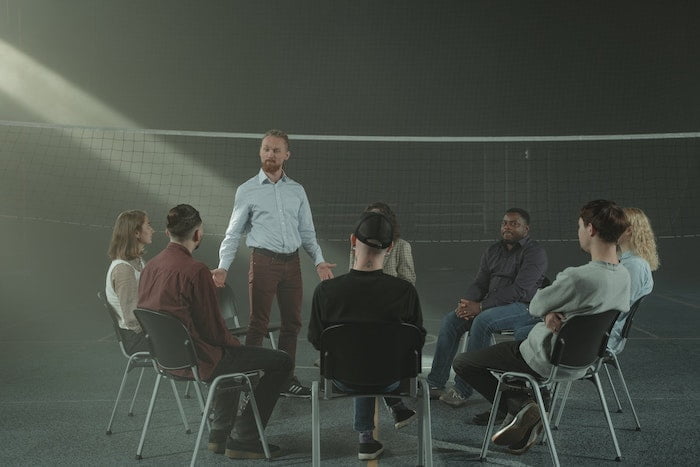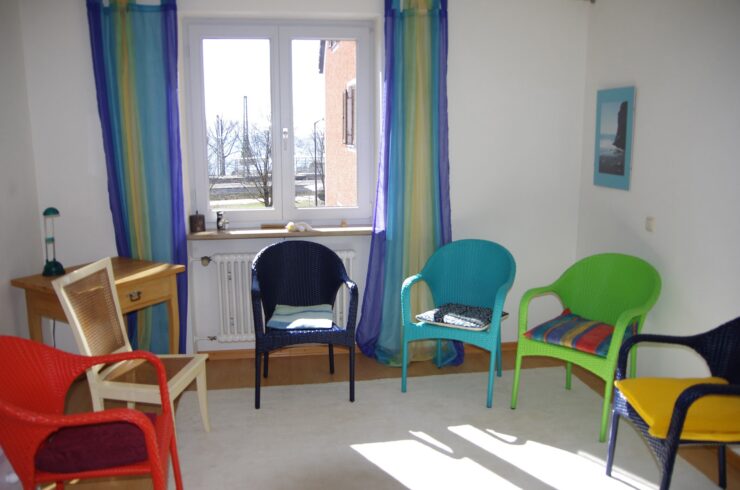Quick links for Nar-Anon Family Meetings
- What is Nar-Anon?
- Going to Nar-Anon
- Goals of Nar-Anon
- Benefits of Nar-Anon
- What happens at Nar-Anon meetings?
- Where did Nar-Anon come from?
- The effects of drug use on families and friends – Why is Nar-Anon needed?
- How do I join Nar-Anon?
- References for Nar-Anon
The impact of addiction is heart-breaking for many, especially for those who love someone with this disease.
Many feel as though there is no place to go and that no one will understand. Addiction can make many people – not just drug users – feel isolated.
The provision of support and social connection for those who are connected to a drug user creates a lifeline for many, one where they’re able to feel braver to face the future.
Nar-Anon [1] creates a space for support that isn’t focused on the person who is using the drugs, but instead on those people who stand witness to the situation.
What is Nar-Anon?

People gathering for a Nar-Anon group meeting
Nar-Anon is a group that evolved out of the existence of the Narcotics Anonymous group. The two fellowships have different aims in whom they support, although the two are linked.
The relatives and friends of an addicted person are those who are supported by Nar-Anon groups.
Narcotics Anonymous, meanwhile, supports the person with the drug addiction themselves.
The only eligibility to attend a Nar-Anon group is that someone close to you has a drug addiction.
Nar-Anon recognises the issues around loving and/or caring for someone with an addiction.
Contrary to popular belief, Nar-Anon (like Narcotics Anonymous and Alcoholics Anonymous) is not a religious fellowship. It is, however, spiritual in the sense that it is faith-based.
Attendees identify their own sense of God or a higher power and use that to draw strength from.
Going to Nar-Anon

Nar-Anon group meeting in progress
Loving someone who is living with addiction comes with a huge range of mixed emotions.
Due to the stigma attached to addiction, it can also be hard to talk about. It can feel as though no one else understands.
The dynamics of the relationship between an addicted person and a relative or friend is complex and commonly misunderstood by others who haven’t experienced it.
Nar-Anon works on the principle that addiction is a disease. It’s therefore an illness that renders a person powerless.
In terms of caring for someone with an addiction, this means there’s nothing you can do to control the person and their choices.
Nar-Anon follows the 12 steps [2] to align their practices with those of Narcotics Anonymous and to give members a beneficial framework to follow.
Due to the fact that addiction affects every part of society, Nar-Anon groups are open to all people.
There is no pressure to talk unless a person wants to. The emphasis at Nar-Anon is on listening to others. This safe, sharing space of understanding has therapeutic effects for many throughout the UK.
Goals of Nar-Anon

People holding their hands together during a Nar-Anon group meeting
There are many benefits for members of Nar-Anon. Often, when you love a person who is addicted to drugs, it’s easy to lose sight of yourself.
Nar-Anon brings the focus back to you.
Common areas that are discussed include:
- Self-care: When you take time to look after yourself you have more energy. This is very important in being able to cope emotionally.
- Wellbeing: Ensuring you do things to promote your own well-being brings value and positivity to your life when things can feel helpless.
Interestingly, looking after yourself is also one of the best ways you can look after your loved one with a drug problem.
Many discover that making time for their own needs has the knock-on effect of improving their connection to the person with the addiction.
Benefits of Nar-Anon

Two members holding hands at a Nar-Anon group meeting
Many Nar-Anon members benefit from the following:
- Support and connection: When people are living through similar experiences and share this, they are able to draw strength from each other. This makes it easier to face each day.
- A space to talk freely without judgement: Speaking to others in Nar-Anon who completely understand the complexities of caring for someone addicted to drugs lifts a weight off people’s shoulders.
- Education: Nar-Anon is often a space where people come to understand more about addiction as a disease. Many gain tips on what self-care means, as well as how addiction is affecting the family dynamics as a whole. There is often support around how to spend a positive, healthy time with your loved one who is ill.
What happens at Nar-Anon meetings?

One person stood up and talking to a circle of people at a Nar-Anon meeting
It can feel incredibly daunting to try new things. This is especially the case where the event is ultimately linked to someone’s addiction.
Exhaustion and emotional fatigue as well as the mental health impact of caring for someone who has an addiction can wipe people out.
From this point of view, it’s helpful to remember that everyone in the room is going through something similar.
Nar-Anon groups are welcoming, friendly spaces where people feel safe and supported. Members tend to go out of their way to make newcomers feel comfortable.
Groups usually take place in a community space, like a church or community hall.
People sit in a circle of chairs and are invited to share their experiences.
Where did Nar-Anon come from?

Empty chairs set up for a Nar-Anon meeting
The original Nar-Anon group was unsuccessful. Thankfully, the fellowship was re-established successfully in 1968 by Robert Stewart Goodrich.
It materialised out of Narcotics Anonymous, where it was identified that relatives and friends needed support as well as people addicted to narcotics.
Nowadays, the fellowship supports millions throughout the world. Nar-Anon works with other support groups to spread their message through various publications and literature.
Usually, some of the literature is available at meetings.
Drug use in the UK

Person taking notes whilst speaking with a member of a Nar-Anon support group
The Office for National Statistics recently reported [2] that 3.2 million people had used drugs in the last year.
1.1 million of these people had used a Class A drug.
Since 1995, Class A drug use has mainly been on the rise in England and Wales.
Around the same time, there were 270,705 adults accessing drug and alcohol services. [3]
It’s safe to assume that there are many more people in the UK suffering from addiction without receiving formal treatment.
With this in mind thousands, if not, millions of people are experiencing the repercussions of loving or caring for someone with drug addiction. This is why Nar-Anon exists – because there is a need for the reality to be acknowledged and for people to have access to support.
The effects of drug use on families and friends – Why is Nar-Anon needed?

Man holding his head and talking to a Nar-Anon sponsor
The consequences of a person using drugs have deep and far-reaching effects on families.
It is sadly very common for the loved ones of addiction sufferers to inadvertently become enablers.
This can be a very difficult situation to navigate.
On the other hand, some family members might develop total apathy and want to wash their hands of the problem, determined to have nothing to do with the person. Some might experience feelings of guilt, whilst others might face frustration.
There’s also the impact of how addiction can affect traditional familial roles. Many children or teenagers might take on caregiver roles.
Attending Nar-Anon meetings is a great environment for people to process their emotions.
There is also often the sharing of useful and practical tips such as how to create and maintain boundaries.
How do I join Nar-Anon?

Nar-Anon members talking together during a meeting
As Nar-Anon is a worldwide organisation there are support groups available in most places.
In the UK, the majority of cities and the major towns host Nar-Anon groups to support the families and friends of addiciton sufferers.
There are also extensive online Nar-Anon options available too.
To find out what your rehab local support options are, contact OK Rehab. We have extensive knowledge of treatment services throughout the UK and can advise you personally.
The sheer amount of people using drugs in Britain means that there are hundreds of thousands of families affected by the devastating impact of drugs.
Knowing where to go for support can feel overwhelming, especially with the difficulties that arise each day when addiction is close to home.
If you’re looking for more guidance on accessing local Nar-Anon groups or getting support for a person who is addicted, you can contact OK Rehab for free today.
OK Rehab also provides guidance in guiding your loved one into seeking rehab. We have extensive knowledge regarding treatment services throughout the UK, meaning that we can run you through your local options and help your loved one directly if they’re ready to begin recovery.
For more information on Nar-Anon, rehab or anything else to do with addiction recovery, contact our team today on 0800 326 5559
References for Nar-Anon
- https://www.nar-anon.co.uk/
- https://www.nar-anon.org/our-principles
- https://www.ons.gov.uk/peoplepopulationandcommunity/crimeandjustice/articles/drugmisuseinenglandandwales/yearendingmarch2020
- https://www.gov.uk/government/statistics/substance-misuse-treatment-for-adults-statistics-2019-to-2020/adult-substance-misuse-treatment-statistics-2019-to-2020-report






